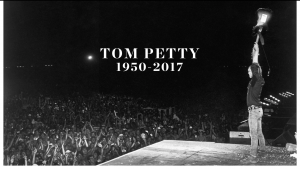
BY SYDNEY BORTON
Local music experts are mourning the loss of Tom Petty, a beloved and vital contributor to rock culture.
“[He has been] extremely musically influential for artists such as Sam Smith, Kings of Leon, The Strokes, and Foo Fighters, Dave Grohl in particular,” said Ken McLeod, associate professor of Music History and Culture at the University of Toronto.
“He is/was one of the most skilled and accomplished pop music songwriters of our time.”
Josh Pilzer, associate professor of Ethnomusicology at U of T said Petty was “like what Bob Dylan would sound like if he could actually sing.”
“I remember listening to [the album] Wildflowers quite obsessively in the early 2000s, especially “You Don’t Know How it Feels”, while I was living in Korea and Japan, and feeling like it somehow took me home… where somebody understood who I was,” said Pilzer.
Walk off the Earth recorded this cover of Petty’s song three days after his death. Profits from sales of the song are going to the Heart and Stroke Foundation.
“Tom Petty was like your cool rebel uncle who smoked weed and talked straight about important things when most of what you had to put up with in a day was work garbage and fake everything,” said Pilzer.
“I didn’t expect it, but I’ve got a hole in my heart that is shaped like him.” Josh Pilzer
Petty died Oct. 2 in Santa Monica, California of a heart attack.
Petty had a wide variety of music styles to reach any audience. “He played to the audience that didn’t want to get as heavy as Led Zeppelin or Black Sabbath, but not as light as, say, The Beatles,” said Owen Tessier, a rock music fanatic and musician. “By kind of playing to the middle of the rock spectrum, he allowed the Zep-Heads to tone it down a bit and allowed the folk-rock, maybe Neil Young-y fan base to turn it up a bit. By playing to the masses, his music still gets radio time.”
Petty was widely known to challenge authority if he didn’t agree with their rules.
“He shook the music industry in the late ’70s by challenging MCA, his record company, for unfair treatment,” said Al Yzereef, part-time instructor and guitar teacher at Cambrian College. “[He declared] chapter 11 bankruptcy to void his record contract. The song “I Won’t Back Down” definitely comes to mind!”
Yzereef admittedly wasn’t a fan of Petty’s until hearing the song “Learning to Fly”.
“Something gripped me,” said Yzereef. “I interpreted the song as having a message about growing older and learning from experiences. I became a fan from that moment on. I was accustomed to blasting my ears out listening to Pantera…suddenly Tom Petty is in the walkman!”
Stephane Ostrander, vocal and instrumental music teacher at Sudbury Secondary School, also spoke fondly of Petty’s lyrical stylings.
“His lyrics are simple, but have other layers of deeper meaning,” said Ostrander. “He really understood music.”
Petty was still playing shows this year, his most recent being a 40th anniversary tour with the Heartbreakers across the United States. McLeod even saw Petty live once, “… some years ago in Vancouver at the old Pacific Coliseum,” he said. “He played for approximately three hours, without a backup band.”
Petty was the frontman of Tom Petty & the Heartbreakers from 1976 to 1987. In 1988, he joined the supergroup Travelling Wilbury’s alongside rock music legends George Harrison (The Beatles), Bob Dylan, Jeff Lynne (Electric Light Orchestra), and Roy Orbison. Petty recorded 20 albums from 1976-2017 as a solo artist and with the Heartbreakers, Traveling Wilburys, and Mudcrutch.
